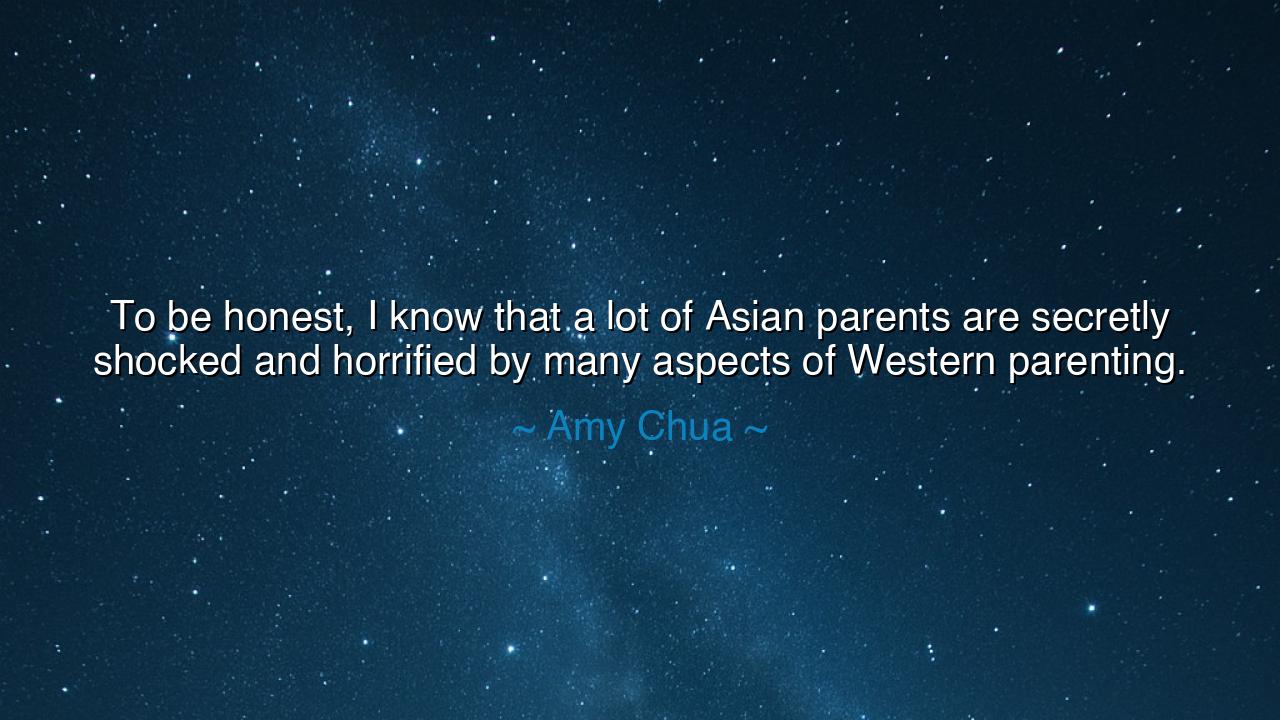
To be honest, I know that a lot of Asian parents are secretly
To be honest, I know that a lot of Asian parents are secretly shocked and horrified by many aspects of Western parenting.






Hear the voice of Amy Chua, who speaks boldly of cultural division and parental duty: “To be honest, I know that a lot of Asian parents are secretly shocked and horrified by many aspects of Western parenting.” These words strike like iron, for they reveal not merely an opinion, but the clash of two great traditions, each carrying centuries of wisdom and expectation. In her observation lies the recognition that parenting is never neutral—it is born of culture, sharpened by history, and charged with the values of entire civilizations.
The heart of her statement lies in the difference between Asian parenting, often rooted in discipline, sacrifice, and the relentless pursuit of excellence, and Western parenting, which in many places values independence, choice, and emotional ease. To Asian parents, accustomed to pushing children toward mastery, the Western habit of allowing children to quit, to negotiate, or to “follow their passions” can seem reckless, even dangerous. To them, such freedom risks creating weakness, entitlement, or mediocrity. Thus, Chua names what is whispered in private: a horror at the perceived softness of Western ways.
History itself offers echoes of this tension. In ancient Sparta, parents raised their children with iron discipline, molding them into warriors who could endure hunger, pain, and hardship without complaint. Their methods, harsh and unyielding, produced strength and survival but at the cost of gentleness. In contrast, Athenian households placed greater value on education, debate, and the nurturing of individuality. From their freer methods emerged philosophers, playwrights, and artists. The difference between Sparta and Athens mirrors the divide Chua observes—discipline versus freedom, rigor versus expression—each carrying both strengths and weaknesses.
Chua’s words also carry a hidden honesty: the shock of Asian parents is not born only of pride, but of fear. They fear that loosening the grip of discipline may allow their children to falter in a world that is merciless in its demands. For centuries, in lands where survival depended on hard work, sacrifice, and achievement, parenting became a crucible of rigor. Every mistake, every indulgence, could mean failure. In such a context, the relaxed manner of Western parents seems not merely strange, but perilous.
And yet, her statement also invites reflection on the limits of strictness. For while Western methods may appear indulgent, they are often born of a desire to cultivate resilience through freedom, creativity through choice, and emotional strength through self-expression. Too much rigor can wound; too much freedom can weaken. Thus, the shock that Asian parents feel must be balanced with humility, for even horror at another’s method may conceal blindness to one’s own excesses.
The lesson, then, is this: parenting is shaped by culture, but children are shaped by balance. The wise parent does not merely cling to tradition or dismiss another’s way in horror, but seeks to learn. Discipline and freedom, rigor and affection, structure and independence—all must be woven together if a child is to grow strong in body, sharp in mind, and whole in spirit.
Therefore, let all who hear take action: examine your own parenting, and do not dismiss the ways of others too quickly. If you are strict, remember compassion; if you are permissive, remember discipline. Take from each culture what strengthens, and cast away what weakens. In this way, you will rise above the shock of difference and create for your children a path that is both firm and loving, demanding and nurturing.
Thus Amy Chua’s words, though sharp and controversial, echo the wisdom of the ancients: what horrifies one culture may be the lifeblood of another, yet true parenting lies not in horror or pride, but in balance. And when we honor this truth, we prepare our children not only for the trials of their culture, but for the trials of the world.






AAdministratorAdministrator
Welcome, honored guests. Please leave a comment, we will respond soon